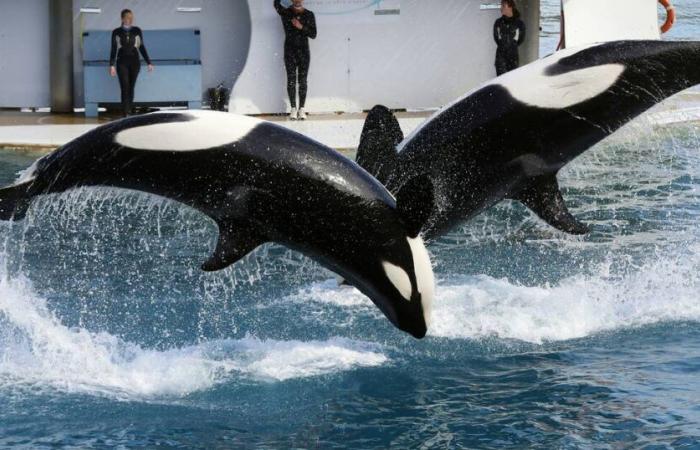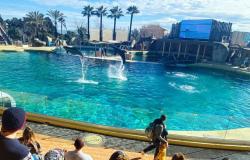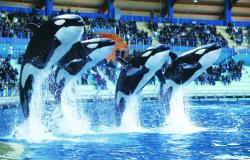
The marine zoo announced this Wednesday, December 4, that it would empty its pools as of January 5 and promised to “relocate” dolphins, sea lions and flamingos to the “best structures.” The associations denounce a lack of anticipation by the park guided by a concern for profitability to the detriment of animal welfare.
They put on a show. The dolphins repeated their somersaults and the orcas continued their jumps. Sharks paraded behind the glass and penguins posed in public. Curtain for these animals. This Wednesday, the Marineland of Antibes, the largest marine park in Europe, open since 1970, announced that it was considering “permanently close the marine zoo as of January 5, 2025.” What will become of its thousands of animals of 152 different species, mostly born in captivity? “It’s not because the park closes that it has to get rid of its animals.” alerts the president of the One Voice anti-captivity association, Muriel Arnal. French law will ban cetacean shows from December 2026. In a press release, the park aims to “priority objective” of “relocate all of its animals in the best existing structures to date”.
No transfer to Japan for orcas
Marineland is the last French zoo to keep orcas. They are the mascots of the park, and the favorite of the associations. Since the deaths of Inouk and Moana, it is the future of Wikie and Keijo, 23 and 11 years old, which is under discussion. Their life expectancy exceeds 60 years. Marineland applied for an export permit to Japan from the Ministry of Ecology at the end of November. Transfer refused. “Japanese parks are subject to legislation that is less protective of animals than in Europe, then wrote Minister Agnès Pannier-Runacher. In addition, traveling 13,000 kilometers would obviously be dangerous for their health. Marineland had been exploring this Japanese track for a year. In January, the park carried out “workouts” so that “the keepers gradually teach the orcas to return without stress, voluntarily in a custom-made stretcher”the Alpes-Maritimes prefecture announced.
The associations are opposed to this transfer, refusing to allow the lives of the orcas to be reduced to “a spectacle”said Muriel Arnal. “The only solution to a better life is the sanctuary, maintains One Voice’s director of investigations, Jessica Lefèvre-Grave. For marine animals, there is only that of Nova Scotia [au Canada] which is sufficiently advanced. But Marineland never wanted to move in that direction.” These reserves are spaces in the open sea, close to land, where orcas could live in the rough waves and salt water, surrounded by a net. The cetacean will have to relearn how to swim and hunt. The orca Keiko, star of Save Willy, had been hosted in this same type of marine sanctuary in Iceland between 1998 and 2002.
The announcement of the closure of the orcas comes the day before the decision of the Aix-en-Provence Court of Appeal. Thursday, December 5, the courts must rule on a request from One Voice. The association requests that the orcas cannot be transferred before the conclusions of an assessment of their health ordered in 2023 are rendered. “Marineland is in close contact with the competent authorities to identify the best solutions to accommodate cetaceans in equivalent structures in terms of quality of care and educational projects with the welfare of the animals as its sole priority,” the park said in its press release.
Reseating a sunfish or dolphin
The park is not just home to orcas. In his «programme» from Wednesday December 4, it is possible to attend the dolphin and sea lion show. You can take part in activities facing seals, sharks, penguins and turtles. With the 26.90 euro ticket, you can also stroll past the pink flamingo enclosures and admire the tropical aquariums. “There are a lot of corals and fish, dit-on an internal. Between a clownfish and a dolphin, it is not the same placement. Marineland is currently working on various avenues to relocate all of the animals to different structures.” One Voice denounces a lack of anticipation and a commercialization of living things. “They continue to do business, deplores Jessica Lefèvre-Grave. They make the most of everything they can. These animals were the heyday of the park. Marineland has a moral duty towards them. But no, these animals are part of the whole thing to be liquidated. They will go to other dolphinariums or other hotel groups.” At the end of October, seals and sea lions were transferred to a zoo in Madrid for an exchange “related to the reproduction of species”.
Eric Devillard visited the park for the first time with his son twenty years ago. Then he became an activist. Former member of the Anti-Captivity Group, he demonstrated every Saturday in front of the park. “For us, activists, it is very psychologically complicated. We don't even know if we should rejoice at this closure, he expresses. It's half a victory. Total victory is if all the animals are rehabilitated.”
On the Marineland website, it is still possible to buy tickets to slip into the shoes of a “dolphin carer” at 99 euros or for “meeting the orcas” at 79 euros. “Come and enjoy a unique and magical experience watching the enchanting shows of orcas, dolphins and sea lions specially designed on the theme of the end-of-year celebrations”, announces the Facebook page of the marine zoo. Fewer and fewer visitors are being tempted: in a decade, Marineland's annual attendance has increased from 1.2 million to 425,000 customers. After January 5, its tanks will empty, from the largest enclosure to the smallest aquarium.





